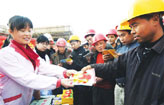Politics
Chaos looms large in prolonged Libyan conflict
Updated: 2011-04-15 17:30
(Xinhua)
BANGHAZI, Libya - It is now a familiar scene in Libya: government troops and rebels trade gunfire and territory, while NATO-led warplanes hover high in sky, ready to hit any government military asset.
| ||||
Civilians becoming refugees
The domestic strife in Libya is dividing the nation, but, more sadly, it is killing the innocent and destroying ordinary families.
Ajdabiyah, some 60 km from the oil town of Brega and a strategic gateway to the rebel's stronghold Benghazi, was once home to about 150,000. But four fierce battles between troops loyal to Libyan leader Muammar Gaddafi and the rebels in the past month have driven away waves of local villagers, and only some 5,000 remain now.
Naji, a man in his 50s, who like others interviewed only identified himself by first name, sent his five children to the relatively calm city of Benghazi after his house was bombed by shells.
"That day, I was at home when my wife was washing clothes in the garage. Suddenly the sound of gunshots erupted and an explosion rocked my house. A shell hit the garage. In just several minutes, I lost my wife forever."
"I have to stay to protect my house and shop, because those are all that I have now," Naji said, showing Xinhua reporters the debris of his car.
"My children's life will be shadowed by what they have undergone after they lost their mother in the war," he said.
Most of the walls along the streets in Ajdabiyah were pockmarked by bullet holes, and houses hit by rockets have been leveled.
Figures released by various sources put the death toll in the de-facto Libyan civil war at over 1,000, and tens of thousands have been displaced by the conflict, not to mention the casualties inflicted by the NATO air offensive.
Earlier in the week, Philippe Lazzarini, deputy director for the coordination and response division for the UN Office for the Coordination of Humanitarian Affairs (OCHA), said the humanitarian situation on the ground in Libya continued to be worrying. Not a day went by "without an account of people being killed, injured or even displaced," he said.
Children suffer most
The killing has spared no one, including children, who should be the last to be exposed to violence and war.
UN figures show hundreds of children have died or disappeared since the war in Libya started. Victims have been as young as nine months and the majority of the children killed are below the age of 10.
In a makeshift asylum in Benghazi, a Xinhua reporter tried to take photos of little boys and girls evacuated from the frontline towns.
But some of them were just so frightened by the clicking of the camera they suddenly burst into tears. When the cameraman tried to show them the pictures, no one had the courage to come close.
"That's all right. Don't be afraid," said Mustafa, a young father from Ajdabiyah, comforting his two-year-old weeping son Ahmed, who must have confused the sound of snapshots with the gunshots he had heard too often recently.
"Ahmed cries almost every night now. He was not like this before," Mustafa told Xinhua reporters.
Hassan, a three-year-old boy, also from Ajdabiyah, held the same fear of the cameraman's "weapon." When clashes first broke out in their town, the roaring warplanes and heavy gunshots had scared her son, Hassan's mother said.
Older kids are not afraid of guns, bullets or even tanks. Ironically, they play with them.
Seven-year-old Annas lived with his father, grandmother and two sisters in Ajdabiyah. His father kept Annas with him in the frontline town because "nowhere is safe and the children feel better with their parents."
Annas always holds a gun that is almost as tall as himself when playing with his three-year-old younger sister Hnin.
"I was very scared when I heard gunshots and explosions outside. But I will be a soldier to protect my family with this gun," Annas said.
About 20 km south of Benghazi, five government tanks were destroyed by the West's warplanes. Some children, accompanied by their parents, were playing with the abandoned tanks, studying the huge war machines inside and out.
In Benghazi, where schools have been closed, the pictures of dozens of children who died as victims of clashes that they knew nothing about were hung on the "Martyr Wall" in Revolutionary Square.
"I don't want to hear the gunshots, I am scared," Hadai, a 10-year-old girl in Benghazi, told Xinhua. "I want to go back to school to study history and draw pictures," she said.
Her father said: "We are all expecting the unrest to end as soon as possible, so that my children can live and study in a peaceful society."
Danger everywhere, everyone fights
But the wish of Hadai's father may not be easily realized, as pro- and anti-government forces are stuck in a stalemate, especially in Brega, which has repeatedly changed hands and remains a contested town.
Brega, along with the eastern town of Ras Lanuf, produces the lion's share of Libya's 1.5 million barrels-a-day oil exports, which have been badly affected by the outbreak of the turmoil.
The two sides were reportedly locked in new clashes earlier this week on the outskirts of Brega, after the rebels rejected a roadmap initiated by the African Union (AU) calling for a ceasefire. The rebels said the initiative fell short of their expectations for Gaddafi to step down.
Along the road leading to Brega from Ajdabiyah, Xinhua reporters have seen battered cars and trucks destroyed by shells. A tank which had been hit by a NATO strike sat grimly separated from its turret by 10 meters.
Rebels, standing guard hundreds of meters from one another along the roadside, seemed more than ready to pitch into the battleground at the frontline to join the fight.
Indeed, as the war in Libya sees no immediate signs of abating, almost everyone has turned into a soldier.
Some in khaki or camouflage gears, others with well-marked red Arabic scarves, and still some others wearing shabby slippers and clumsy jeans, the out-of-uniform rebels were only distinguished from ordinary citizens by the submachine guns in their hands and the fully loaded cartridge clips in the back trunks of their pickups.
When he was interviewing a group of residents in Benghazi, a Xinhua reporter said, many others rushed in high spirits to the camera to express themselves.
Before the interview ended, a bearded man in the crowd pulled out his pistol and fired five shots into the air in exuberance.
The behavior, unexpected and stunning, was also a warning that danger is almost everywhere in the violence-torn country, where earlier reports said a newly-recruited rebel fighter accidentally killed himself when cleaning his own gun.
Fear of another failed state
The rebel fighters have no training and are also poorly equipped. Most of them have only weapons such as AK-47s made in the 1960s or 1970s and machine guns mounted on pickups.
Although the government troops have suffered strikes from the NATO bombing, they are well trained and could easily overrun rebel bases with tanks and artillery, if not prevented by NATO's warplanes.
The prospect of a military stalemate has prompted calls for a political solution to the Libyan conflict through dialogue and negotiation.
NATO Secretary General Anders Fogh Rasmussen said Monday that military action alone would not solve the crisis in Libya. The African Union (AU) and Turkey have each tried to broker a peace deal in Libya, while representatives from regional and international organizations as well as countries concerned met in Doha, Cairo and Berlin in search for ways out of the conflict.
But so far no viable solution seems to emerge. Libyan rebels have rejected the AU and Turkish proposals, while Gaddafi shows no signs of yielding to the demand by NATO countries and their allies to step down and leave the country.
Even within NATO, a rift exists over how to handle the war. France and Britain want to step up the air strikes while the United States, Germany and Spain are reluctant to expand military mission.
As a quick end to the turmoil is still out of sight, the specter of another failed state haunts many minds.
Speaking to the media earlier this week, Libya's former foreign minister, Moussa Koussa, who fled to Britain last month, said the continuing war would risk turning Libya into a second Somalia.
The longer the chaos goes on, the more misery will be borne by the ordinary people.
"The war is a painful memory for all citizens ..." Naji, the Ajdabiyah resident, told Xinhua. "I lived a normal life but the war has destroyed it."
E-paper

Han me downs
Traditional 3,000-year-old clothes are making a comeback.
Reaching out
Fast growth fuels rise in super rich
Chinese tourists spend more
Specials

Big spenders
More mainland tourists are expected to spend money on overseas travel this year.

Rise in super rich
Report cites rising property prices, gdp as key drivers of increasing number of chinese millionaires.

Reaching out
Condom makers are stepping up their presence in smaller cities to boost sales



